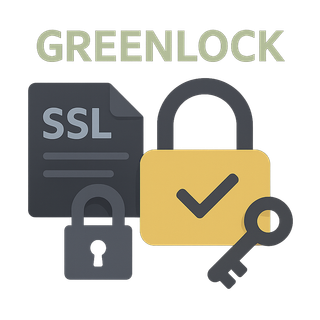
Doh's Greenlock integration helps you manage SSL certificates for your applications using Let's Encrypt. It automatically handles certificate issuance, validation, and renewal so you don't have to worry about manual certificate management.
This guide covers:
- Setting up Greenlock in your Doh application
- Configuring domains and subdomains for certificates
- Understanding automatic certificate renewal
- Working with the Express server integration
- Troubleshooting common certificate issues
Overview
The Greenlock integration offers:
- Automated certificate issuance for domains and subdomains using built-in ACME client
- Scheduled certificate renewal
- Support for multiple domains and subdomains
- Configurable renewal thresholds and timing
- Staging option for testing without rate limits
- Command-line options for manual renewal
- No external dependencies - works with Node.js, Bun, or DohRuntime
- Smart server detection for challenge handling
Configuration
Configure Greenlock in your pod.yaml file under the letsencrypt section:
letsencrypt:
# Required email for Let's Encrypt notifications
email: "admin@example.com"
# Use staging environment for testing (no rate limits but certificates aren't trusted)
staging: false
# Primary domains to secure
domains:
- "example.com"
# Subdomains to secure (will be applied to each primary domain)
subdomains:
- "www"
- "api"
# External domains (complete domains that are separate from your main domains)
external_domains:
- "other-site.com"
# Random time between 2-4 AM by default
renewal_hour: 3
renewal_minute: 15
# How often to check if renewal is needed (in milliseconds)
checkInterval: 3600000 # 1 hour
# Number of days before expiration to attempt renewal
renewal_threshold_days: 30
Integration with Express Server
The Express server automatically detects and uses SSL certificates managed by Greenlock. When SSL is enabled:
- The server first checks for certificates specified in the
ssl_infoconfiguration - If not explicitly configured, it looks for Let's Encrypt certificates at the standard path:
/etc/letsencrypt/live/[hostname]/privkey.pem/etc/letsencrypt/live/[hostname]/fullchain.pem
This means once Greenlock successfully issues certificates, your server will use them automatically:
express_config:
hostname: "example.com"
port: 80
ssl_port: 443
# SSL info can be omitted if using standard Let's Encrypt paths
# or you can explicitly set paths:
ssl_info:
keyfile: "/etc/letsencrypt/live/example.com/privkey.pem"
certfile: "/etc/letsencrypt/live/example.com/fullchain.pem"
Certificate Renewal
Certificates are automatically renewed based on these conditions:
- The certificate will expire within the configured threshold (default 30 days)
- The current time is within the scheduled renewal window
- No renewal has occurred today
The renewal process follows HTTP-01 validation, requiring your server to be publicly accessible on port 80 during the renewal process. The module includes smart server detection:
- If your Express server is running, it will use the configured webroot to serve challenge files
- If your Express server is not running, it will temporarily start its own HTTP server on port 80 to handle the challenge
- After certificate issuance/renewal, any temporary server is automatically stopped
Manual Certificate Renewal
To force a certificate renewal regardless of expiration date:
doh force-greenlock
This is useful when:
- You've added new domains or subdomains
- You're switching from staging to production
- Your certificates have become invalid for any reason
Requirements
To use Greenlock integration:
- Ensure your server is accessible from the internet on both HTTP (port 80) and HTTPS (port 443) (Meaning to check firewalls and routes, Doh will serve any required content or files for the validation process)
- Configure a valid email address for expiration notifications and recovery
The module will automatically install the necessary ACME client dependencies when you run doh install greenlockcli.
Domain Validation
Let's Encrypt validates domain ownership using the HTTP-01 challenge method:
- Let's Encrypt provides a token
- Greenlock places this token at a specific URL on your server
- Let's Encrypt verifies this token is accessible
- Certificate is issued upon successful validation
This requires that:
- Your server is publicly accessible on HTTP port 80 (use the doh methods of pod settings and/or forcing to automatically run the required servers)
- No proxy or firewall is blocking the
/.well-known/acme-challenge/path or port 80/443
Troubleshooting
Common issues and solutions:
Certificate Renewal Failures
- Check your server is publicly accessible on port 80/443 (not blocked in firewall)
- Ensure
/.well-known/acme-challenge/path is not blocked - Verify DNS records point to your server
- Check disk permissions for certificate storage location
- Review the ACME client logs for specific error messages
Rate Limiting Issues
- Use
staging: trueduring testing to avoid hitting rate limits - Rate limits apply per domain and per IP address
- Let's Encrypt has a limit of 5 certificates per domain per week
Certificate Not Found
If your server reports it cannot find the certificate files:
- Check that renewal was successful in the logs
- Verify the correct paths are configured in
ssl_info - Ensure the process has read permissions for the certificate files
- Try forcing a renewal with
doh force-greenlock
Smart Server Detection Issues
If the module has trouble detecting or starting servers:
- Check that port 80 is not already in use by another process
- Ensure your firewall allows incoming connections on port 80
- If running behind a proxy, ensure port 80 is properly forwarded to your server
- The module will show whether it's using an existing server or starting a temporary one in the logs
Best Practices
- Start with
staging: trueduring initial setup and testing - Use a valid email address that you monitor for certificate expiration notices
- Set the renewal threshold to at least 30 days to allow plenty of time for renewal attempts
- Store certificates in a persistent location that survives container restarts
- Centralize certificate management if running multiple services or containers
Security Considerations
- Keep your host secure to prevent unauthorized certificate issuance
- Certificates are public information, but private keys should be protected
- Let's Encrypt certificates are valid for 90 days to limit damage from key compromise
- Use the
renewal_threshold_daysparameter to control how aggressively renewals are attempted